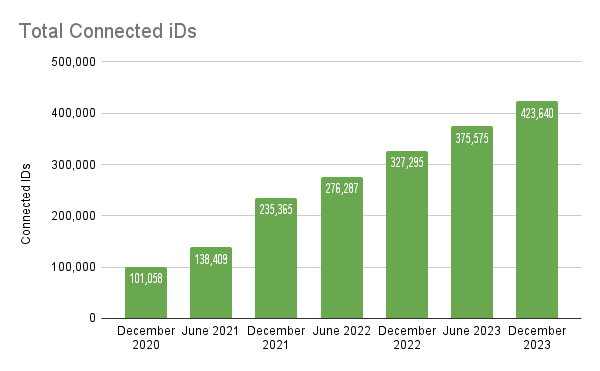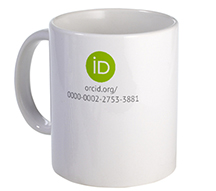It’s been five years, and the ORCID US Community is still steadily growing, with plenty of exciting updates and important information from across the community below. Past newsletters can be found in the ORCID US Community Blog. To contribute to future newsletters, please email orcidus@lyrasis.org. Thank you!
Community Snapshot
Member institutions = 207 (as of December 1, 2023)
ORCID API system integrations = 329 integrations, through which:
- 74,173 ORCID records have been updated with:
- 43,666 affiliations
- 1,686,424 works
- 5,067 funding entries
- 9,507 person identifiers
- 4,335 websites
- 423,640 ORCID iDs have been connected with member organizations:

Total Connected iDs: The total number of researchers that have connected their ORCID iD to a member ORCID API integration belonging to the ORCID US Community consortium. Each researcher is only counted once, no matter how many API integrations they have connected with.
Meet our New Program Assistant!
We are excited to introduce our newest ORCID US Community team member, Kaela Ramhit. Kaela joined Lyrasis on November 27 as the ORCID US Community Program Assistant. She will be working with Sheila Rabun and Paolo Gujilde in managing our growing ORCID US Community. Prior to joining the Lyrasis, Kaela was the Evening Programming and Instruction Assistant at the University of Florida’s George A. Smathers Libraries in which she served as the evening supervising staff at the circulation desk and supported the hiring and training of student assistants. She also liaised with the University of Florida’s Office of Academic Support and Disability Resource Center and has presented at library conferences on topics related to access and accessibility. Kaela received her Master’s degree in Library and Information Science from Syracuse University and her Bachelor’s degree in English from Florida State University.
ORCID US Community Awardees

The ORCID US Community Awards encourage and provide recognition for participation within the community, in areas of outreach, and for individual achievements. This year, we want to recognize and congratulate our colleagues who were nominated by their peers and the volunteers who contributed to our discussions this year. We also would like to recognize our member organizations on their outreach efforts and custom ORCID API integrations this past year.
Congratulations to our award recipients!
- “Most Helpful” Individual: Rebecca A. Welzenbach, Research Impact and Information Science Librarian (University of Michigan), nominated and recognized for their support of colleagues doing outreach with ORCID.
Outstanding Outreach Efforts of the Year:
- Emory University (led by Jody Bailey) for creating faculty testimonial videos, outreach materials such as flyers, digital signage, postcards, and other assets distributed across campus, and working with university publications to highlight ORCID in the daily newsletter.
- Ohio University (led by Paul Campbell) for creating an ORCID guide with custom ORCID videos for researchers and graduate students.
- RTI International (led by Bonnie Nelson) for collaborating with multiple internal stakeholders to encourage use of ORCID in research activity reporting, publishing, funding proposals, and including ORCID iDs in posters to publicize internally funded research projects, all resulting in a substantial increase of ORCID adoption across the organization.
We also would like to recognize the following organizations on their outreach efforts this past year:
- Arizona State University
- Augusta University
- Denver Health & Hospital Authority
- Indiana University
- Indiana University Purdue University Indianapolis
- Louisiana State University
- Nemours Children’s Health
- Northeastern University
- Northwestern University
- Ohio State University
- Oklahoma State University
- Stanford University
- Texas Tech University
- University of Arizona
- University of California, Santa Barbara
- University of Georgia
- University of Miami
- University of Michigan
- University of Nevada, Las Vegas
- University of Oklahoma
- University of Tennessee
- University of Wisconsin-Madison
- West Virginia University
Organizational Achievement: The following organizations completed custom ORCID API integrations this year:
- Georgia State University for an application that connects with ORCID and writes “employment” affiliations to ORCID records
- Harvard University for integrating their central identity management system with ORCID
- Johns Hopkins University for linking their JHU directory with ORCID
- National Center for Atmospheric Research (NCAR) for using ORCID as a way to authenticate users of NCAR’s Research Data Archive
- Ohio State University for connecting ORCID iDs through their identity profiles
- Princeton University for connecting ORCID iDs to Princeton NET IDs
- SUNY Binghamton for connecting ORCID with their portal and writing “employment” and “education” affiliations to ORCID records
- University Corporation for Atmospheric Research (UCAR) for connecting ORCID iDs in their human resources system
- University of Idaho for a centralized API integration allowing researchers to connect their ORCID iD with the institution and for writing “funding” and “works” to ORCID records
- University of Vermont for connecting ORCID with their directory information system
- Vivli for pushing “works” into ORCID records via the Vivli platform
Volunteer Recognition: The following individuals graciously volunteered their time to share their experience and insight with others at ORCID US Community organized events/sessions this year:
- Clarke Iakovakis, Oklahoma State University - presented at Expert Finder Systems conference panel
- Emily Hart, Syracuse University - presented at April community call on member reporting
- Iqbal Hossain, University of Arizona - presented at Expert Finder Systems conference panel
- Jeremiah Mercurio, Columbia University - presented at July community call on publishing workflows
- Lori Schultz, University of Arizona - presented at June community call on NSPM-33 updates, and Expert Finder Systems conference panel
- Matthew Brannen, Denver Health and Hospital Authority - presented at 2023 showcase webinar
- Mick Chambers, Georgia State University - presented at 2023 showcase webinar
- Riley Taitingfong, University of Arizona - presented at the November community call on FAIR and CARE principles
- Zach Chandler, Stanford University - presented at 2023 showcase webinar, and Expert Finder Systems conference panel
- Laura Burtle, Georgia State University - presented at 2023 showcase webinar
It’s never too early to think about next year’s awards. Remember to nominate your colleagues for the “Most Helpful Individual” award and nominate/self-nominate an organization for Outstanding Outreach Effort of the Year by Nov. 30, 2024! More details, including award categories, can be found on our ORCID US Community Awards page.
FAIR, CARE, and Persistent Identifiers (PIDs)
The ORCID US Community and ORCID-CA held a community discussion on how the FAIR Principles and the CARE Principles for Indigenous Data Governance relate to Persistent Identifiers (PIDs) such as ORCID iDs and DOIs on November 1, 2023, with special guest speakers Mike Nason (Open Scholarship & Publishing Librarian, University of New Brunswick Libraries) and Dr. Riley Taitingfong (Luce Foundation Postdoctoral Researcher, Native Nations Institute, University of Arizona). The speakers shared their insights on Findability, Accessibility, Interoperability, and Reuse (FAIR) and Collective Benefit, Authority to Control, Responsibility, Ethics (CARE) with emphasis on the implications and considerations involved for those working with PIDs in the research and scholarly communication ecosystem. For notes and recording of the discussion, please visit FAIR, CARE, and Persistent Identifiers (PIDs).
ORCID US Celebrates 200th Member Organization!
 The ORCID US Community consortium celebrated our 200 member milestone this past July! As the largest ORCID community of practice in the world, the ORCID US Community consortium has demonstrated success in ORCID adoption across the United States.
The ORCID US Community consortium celebrated our 200 member milestone this past July! As the largest ORCID community of practice in the world, the ORCID US Community consortium has demonstrated success in ORCID adoption across the United States.
With Lyrasis as its consortium lead, the ORCID US Community consortium has spent the last five years making a tangible impact on member communications, fostering shared knowledge and resources, and making integration with the ORCID registry more effective and widespread.
For more information about this achievement, and about other achievements from the ORCID US Community, you are invited to read this blog post: ORCID US Community Consortium Celebrates Its 200th Member!
Fee Changes (2024)
Beginning January 1, 2024, the fee structure for ORCID US Community member organizations will be shifting to a tiered model based on the total annual budget for each member organization. The new fee model can be found on our ORCID US Community Membership page. Please see our Fee Change FAQ document for more details, and direct any additional questions to orcidus@lyrasis.org.
Random “Coffee Breaks”
The next round of “Coffee Breaks” starts in February 2024, for any community members who are interested in meeting with colleagues at other ORCID US member organizations to talk about ORCID and get to know each other throughout the year. If you would like to participate, please see the details and sign up.
Membership Updates
As of December 1, 2023 the ORCID US Community has reached 206 members in our fifth year running as the largest ORCID consortium in the world. Learn more about other ORCID consortia across the globe. See a full list of ORCID US Community member institutions.
New Members since July 2023:
- American Association of Physicists in Medicine
- American Cancer Society
- American Institute for Cancer Research
- Binghamton University (SUNY)
- Dryad
- North Carolina A&T State University
- Seton Hall University
- United States Coast Guard Academy
- University of Nevada, Reno
- University of Vermont
New Community Resources
ORCID US Community resources can be found on our Community Resources page and our Technical Support page. New resources include:
Webinars:
- ORCID Workshop for Researchers (August 30, 2023)
- Community Showcase #9 (September 20, 2023)
Community Calls:
- ORCID in Publishing & Peer Review (July 26, 2023)
- FAIR, CARE, and Persistent Identifiers (PIDs) (Nov 1, 2023)
Recommended Resources
- Visualizing institutional activity using persistent identifier metadata, by Aghassibake, N., Castello, O.G., Gujilde, P., and Rabun, S.
- The ORCID US Consortium at Five: What’s Worked, What Hasn’t, and Why?, by Meadows, A.
- Summarizing ORCID Record Data to Help Maintain Integrity in Scholarly Publishing, by Demain, P., and Demeranville, T.
- New to the ORCID Record Interface—Professional Activities, by Demeranville, T., Demain, P., and Dineen, D.
Have you been involved in ORCID presentations or outreach activities lately? Do you have ORCID news that you’d like to share? Let us know so we can include you in the next newsletter: orcidus@lyrasis.org.
